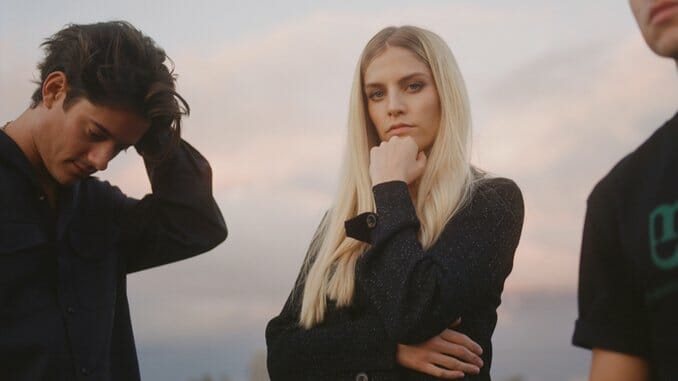London Grammar’s Hannah Reid Stands Firm on Californian Soil
Photo by Alex Waespi
Hannah Reid had yet to view Carey Mulligan’s Oscar-nominated performance in the recent film hit Promising Young Woman, but it hadn’t opened in her native Britain yet and she was looking forward to catching it online. And the London Grammar vocalist swears that there was no subliminal connection when—on March 8 this year, for International Women’s Day—she designed a stark black-on-white T-shirt that read “Formidable Young Woman,” which tuned into the same post-#metoo-movement mindset of the movie. Like Mulligan’s vengeful protagonist, however, she too had experienced the knuckleheaded patriarchy firsthand, and she had thoroughly had enough.
The shirt sells for 25 pounds, with all proceeds going directly to Care International U.K., a women’s charity personally chosen by Reid. And the soundalike phrase had its origins in one of her worst music-biz experiences, when she ended up arguing with a male security guard at a London Grammar concert, who denied her backstage access, not believing that she was that evening’s star attraction. When she finally proved her identity and was waved in, the employee derisively summarized her feisty determination as her being a “formidable young woman”—essentially longhand for the derogatory men’s catchall of “bitch.” Not the way an artist should be treated, especially at her own headlining performance. But it was by no means the first time, so she resolved to do something about it, a decision that led to London Grammar’s lush new third set, Californian Soil, over which she took firm, confident control.
Sonically, the album has the reverent, hushed feel of an intimate, rose-windowed cathedral, with Reid’s gossamer, radiant voice illuminating the interior like a beam of Sunday morning light. It even opens on “Intro” with the solemn tolling of a chapel bell, before settling into the exotic rhythms of the title track, then a finger-snapping “Missing,” a shimmering stroll called “Lord It’s a Feeling,” the bright, galloping “Baby It’s You,” and the nearly monastic “All My Love,” Reid’s tour-de-force showcase in this collection. And she can go from Top 40-casual (“Lose Your Head”) to Wagnerian oomph (“I Need the Night”) in a seemingly offhanded heartbeat. No stifling patriarchy restraining her this time, no producer telling her she has no right to correct him on wonky studio tones (yes, that’s happened quite often, she sighs). A formidable new force, indeed.
When Reid entered the music industry in 2009 with her Nottingham bandmates—guitarist Dan Rothman and keyboardist/percussionist Dominic ‘Dot’ Major—she admits that she was naive and trusting. “I was young and I was quite green, and I think I thought that the music industry would be the most liberated, woke place on the planet,” she recalls. “Because I was like, ‘Well, of course it would be because it’s art, and art is always, by nature very forward-thinking.’ And it was just such a shock that it was absolutely the opposite of that in so many, many ways.” She believes the film industry runs the same archaic way, as well. “The structures-that-be hold a lot of power, so I definitely felt like I had to go along with certain … just crap, basically, that I was putting up with in my early career. Then it got to a point where I was like, ‘You know what? I’m going to speak about this! I am going to make an album about it, and I am going to speak about it, because it really is my truth,’” she adds.
Mulligan, in an added irony, spoke those same speak-my-truth words when hosting Saturday Night Live last week, in a biting anti-entitled-millennials Star Trek sketch, wherein she takes histrionic offense at the slightest criticism, having never experienced any harsh societal judgment before. But Reid truly has a list of serious grievances—she’s not imagining anything. And the problems started early on, almost as soon as the band had released its chart-topping 2013 debut disc, If You Wait. “I remember our first management company booking an entire tour without even telling us, without us having any approval of our own schedule,” she growls, still bristling at the thought. “That went on for quite some time, and I really tried everything to get them to stop doing it. I tried being nice about it, I tried getting angry, and then I tried somewhere in the middle, and they would just not stop doing it.” Some future dates weren’t even physically possible, like playing Australia, arriving back in London for a show 24 hours later, only to hop on the next flight back to Australia. “And for me just being a woman and being very vulnerable, that was the first time I’d experienced anything like that—they didn’t care or have any sense. It was just all about the money,” she says.
-

-

-

-

-

-

-

-

-

-

-

-

-

-

-

-

-

-

-

-

-

-

-

-

-

-

-

-

-

-

-

-

-

-

-

-

-

-

-

-








































